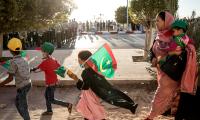“We help African NHRIs gain independence and effectiveness"

A young girl carries the national flag of Mauritania ahead of the sixtieth anniversary of Independence for Mauritania in Nouakchott on November 28, 2020. Photo: John Wessels/AFP/Ritzau Scanpix
For years local CSOs and NGOs in Mauritania, particularly the most vocal critics of the government, criticised the National Human Rights Commission of Mauritania for lack of independence from the executive. Their argument was based on the Executive Order, which established the NHRI, placing its leadership under the appointing authority.
As a result of this critique as well as complaints about lack of pluralism, GANHRI’S Sub-Committee on Accreditation recommended downgrading of the Commission from’ A’ to ‘B’ in 2017 if by November 2018 it could have not received sufficient response against this and other accusations. To enable the Commission to be more effective in fulfilling its mandate of promoting and protecting human rights, NANHRI has been encouraging the Commission since 2017 to strengthen its cooperation with a wider range of civil society organisations and NGOs. The Mauritania Commission is one of the national human rights institutions across Africa that NANHRI is helping with support from the NHRI-EU project in gaining full independence and effectiveness in compliance with the Paris Principles.
No voices should be left out
“A strong and independent NHRI builds bridges and facilitates dialogues between civil society and the government. As Mauritania’s national human rights commission and the civil society in many areas, for instance education and health, are aiming for the same goals, it is important that they join forces. No voices should be left out,” Robert Laban, communications and advocacy officer, NANHRI, says.
Mauritania’ population faces major challenges, such as slavery in some parts of the country, food insecurity, malnutrition, gender inequality, terrorism, youth unemployment and land degradation. In terms of education, the government of Mauritania in recent years has ensured more children have access to and complete primary school. However, transition to lower secondary school remains a challenge, especially for girls. In 2013, only 55 girls out of every 100 were able to transition from primary to lower secondary school (compared to 61 boys out of every 100), according to the NGO, Global Partnership for Education.
Facing root causes of terrorism
“Unemployment, poverty and lack of access to quality education are fundamental drivers of terrorist violence. A strong NHRI able to report and collaborate widely with civil society will be able to face some of the root causes of terrorism, which the country is dealing with. Enhanced access to quality education is one of them,” the NANHRI Communications and Advocacy Officer says and refers to an important meeting, where the Commission and the civil society organisations agreed on developing joint actions to different areas, such as education and health, with the purpose of enhancing vulnerable children and girls’ access to quality education. In another meeting the CSOs and NGOs committed to complement the Mauritanian NHRI in addressing human rights violations in the country.
Further, NANHRI in advocacy missions lobbied the government of Mauritania through meeting the Minister of Justice to engage parliament, leading to a new establishing law in 2019. The new law grants independence to the institution as provided for by the Paris Principles. The Commission was reconstituted in February 2019 under new leadership in preparation for reaccreditation in December 2020.
